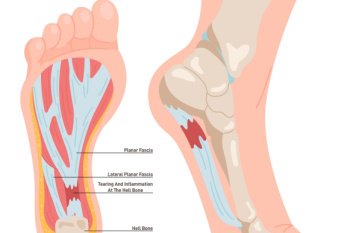
Plantar fasciitis is a common foot condition characterized by pain and inflammation in the plantar fascia, the thick band of tissue connecting the heel to the toes. This tissue supports the arch of the foot, but repetitive stress or strain can cause tiny tears, leading to irritation and discomfort. The hallmark symptom is sharp heel pain, especially noticeable with the first steps in the morning, or after periods of inactivity. People who are on their feet for long periods, have flat feet or high arches, or wear unsupportive footwear are more prone to developing plantar fasciitis. Treatment focuses on reducing inflammation and supporting the arch. Stretching exercises, custom orthotics, and anti-inflammatory medications are common approaches. Severe cases may benefit from targeted exercises, steroid injections, or, in rare instances, surgery. If you have heel pain, it is suggested that you visit a podiatrist for a proper diagnosis and treatment.
Plantar fasciitis can be very painful and inconvenient. If you are experiencing heel pain or symptoms of plantar fasciitis, contact Ankita Patel, DPM from All Pro Foot and Ankle. Our doctor can provide the care you need to keep you pain-free and on your feet.
What Is Plantar Fasciitis?
Plantar fasciitis is the inflammation of the thick band of tissue that runs along the bottom of your foot, known as the plantar fascia, and causes mild to severe heel pain.
What Causes Plantar Fasciitis?
- Excessive running
- Non-supportive shoes
- Overpronation
- Repeated stretching and tearing of the plantar fascia
How Can It Be Treated?
- Conservative measures – anti-inflammatories, ice packs, stretching exercises, physical therapy, orthotic devices
- Shockwave therapy – sound waves are sent to the affected area to facilitate healing and are usually used for chronic cases of plantar fasciitis
- Surgery – usually only used as a last resort when all else fails. The plantar fascia can be surgically detached from the heel
While very treatable, plantar fasciitis is definitely not something that should be ignored. Especially in severe cases, speaking to your doctor right away is highly recommended to avoid complications and severe heel pain. Your podiatrist can work with you to provide the appropriate treatment options tailored to your condition.
If you have any questions please feel free to contact our office located in Swedesboro, NJ . We offer the newest diagnostic and treatment technologies for all your foot and ankle needs.
